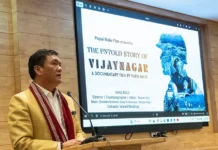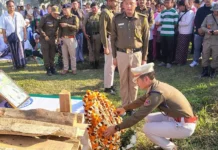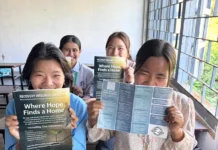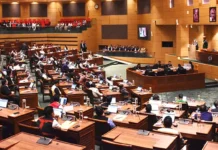ITANAGAR, Aug 18: Chief Minister Pema Khandu on Monday warned that the growing “money culture” in elections is a major menace threatening the democratic fabric of the state, and urged legislators and citizens alike to collectively fight the practice.
“Money culture (distributing money to woo voters) in elections is a big menace for the state. We should work collectively to shun this practice, which affects our state. This should be discussed in public forum and people must be made aware of its negative impact through community participation,” Khandu said while addressing the special session of the state Assembly convened to mark the golden jubilee of its existence.
Linking the issue to the state’s larger democratic journey, the chief minister said that the Assembly’s 50 years were “not just a milestone, but a testament to the strength of our democracy, to the voices that have been heard, and to the progress we have made together.”
Tracing the Assembly’s history, Khandu recalled that proceedings began on 18 August, 1975, with 33 members under the leadership of the first chief minister PK Thungon, Speaker Nokmey Namati, and Deputy Speaker Padi Yube.
Since then, the House has conducted 137 sessions spanning 457 sitting days and passed 273 important Acts.
He acknowledged that the number of sittings was relatively low compared to the years gone by.
“Our efforts should be to ponder how the number of sessions could be increased in the coming days,” he added.
The chief minister highlighted milestones, including the adoption of the e-Vidhan system, which made Arunachal Pradesh the first state in the Northeast and the third in the country to go paperless.
He also pointed to the Assembly’s growing national and international profile, having hosted the Commonwealth Parliamentary Association’s India Zone-III conference in May 2022 and the G20 Summit in March 2023.
“Despite opposition by China, Prime Minister Modi gave us the go-ahead with the G20 summit, which we organised successfully,” he said.
Khandu also cited historic state-specific regulations adopted by the Assembly, such as the Bengal Eastern Frontier Regulation of 1873, now known as the inner line permit (ILP), along with the NEFA Regulation of 1965 and the NEFA Panchayati Raj Regulation of 1967.
“These old regulations adopted in the state are still protecting us,” he noted.
Emphasising the motto “unity in diversity,” the chief minister said, “Despite having various tribes with diverse culture and traditions, we are one. We need to carry forward this legacy in the days to come, in which the Assembly will play an important role.”
Khandu urged lawmakers to work with consensus to identify and address challenges ahead, stressing that with political will, the state could achieve wonders.
“In the last decade, we have proven it as Team Arunachal. If we have political will, nothing is impossible. We should convert our resources into policies for the development of the state,” he added.
Deputy CM calls for making state developed by 2047
Participating in the discussion during the special session of the Assembly on its golden jubilee celebration, Deputy Chief Minister Chowna Mein urged the members of the Assembly to take a pledge to work towards making the state developed by 2047.
Mein said that the state government under CM Khandu is committed to tapping the immense potential of the state to make it developed by 2047.
“The state government is working in this line through the mantras of reform, perform and transform. We have brought many reforms in governance with political will for a ‘swachh’ (clean), ‘swasthya’ (healthy), ‘sikshit’ (educated), ‘sashakt’ (empowered) and ‘sundar’ (beautiful) Arunachal,” Mein said.
He highlighted key ongoing and completed projects, stating that the government is working hard to accelerate development of the state.
“Today, we are here to discuss our 50 years of glorious chronicle of the Assembly, the journey of which reflects the toil of all the former chief ministers and members. The state witnessed massive development in the last 50 years due to contributions of all the former and present lawmakers of the state,” he added.
Mein further noted that Prime Minister Narendra Modi took various initiatives to honour freedom fighters and contributors to the nation’s growth.
“Azadi ka Amrit Mahotsav is one such movement under which the state government identified more than 220 unsung heroes of the state who made sacrifices for the country’s independence. Tiranga Yatra is another movement launched by the PM to honour the freedom fighters,” he said.
Earlier, initiating the discussion, Parliamentary Affairs Minister Pasang Dorjee Sona said that the Assembly, since its inception, has conducted 137 sessions covering 457 days of business.
“The Assembly has so far witnessed 18 members being appointed as Speakers and 20 as deputy speakers, with Nokmey Namati as the first Speaker. The present building is one of the best in the country, and the main purpose of the Assembly is to enact laws for the benefit of the people and the state,” Sona said.
He said that Arunachal is the only state where Assembly sessions are held without any disruption.
“We play development politics within the House, which is unique in nature and every member contributed to the growth of the Assembly,” he noted.
Joining the discussion, NCP member Toko Tatung said the evolution of the state from a remote tribal tract to a full-fledged Indian state is of strategic importance.
“The former leaders have made the Assembly a ground to speak for the people. It is not the building but the people who represented it to make the Assembly better,” Tatung observed.
People’s Party of Arunachal (PPA) legislative party leader Oken Tayeng lauded the sacrifices of former leaders who shaped the assembly, while NPP legislator Thangwang Wangham described it as “a living chronicle of the state’s evolution.”
“The visions of the former leaders have laid the foundation of the Assembly from ancient traditions to the modern democratic system, which is the uniqueness of our political history and a pride for us,” Wangham added.
Congress MLA Kumar Waii, the lone member from his party, called for equitable development of all constituencies, cautioning that without it, the vision of a ‘Viksit Arunachal’ (developed Arunachal) would remain a distant dream.
Legislative Assembly Speaker Tesam Pongte said the state has witnessed a dynamic interplay of indigenous traditions, colonial legacies, and post-independence aspirations.
He said that the 45-day golden jubilee celebrations, inaugurated by Governor KT Parnaik on 3 July, culminated on Monday.
Former chief ministers, including the first CM PK Thungon, as well as former ministers and MLAs, also attended the special session.
LS Speaker hails golden jubilee
Lok Sabha Speaker Om Birla in a video message congratulated the Arunachal Pradesh Legislative Assembly on completing 50 glorious years of its journey.
In a virtual message, Birla described Arunachal as the finest example of unity in diversity, noting that the Assembly has kept alive the aspirations of the people by enacting over 600 legislations so far through healthy debates.
“Healthy debate is one of the hallmarks of the Arunachal Pradesh Assembly, and being a temple of democracy, the lawmakers should continue to keep the aspirations of the people alive,” Birla said.
Urging the members to work for the state’s progress, the Speaker said that the golden jubilee must serve as a strong reminder for legislators to work with diligence for the prosperity of the state. (PTI)




